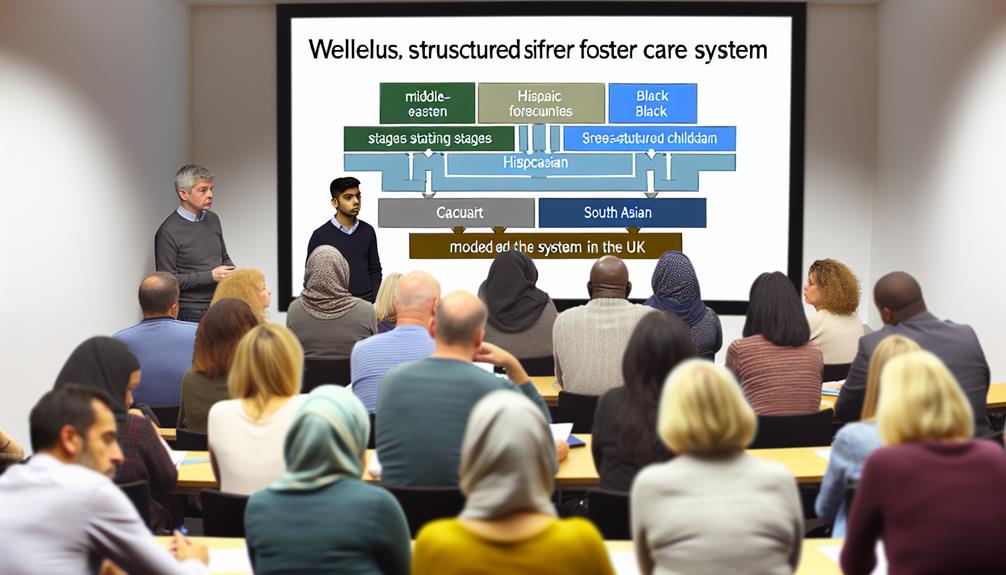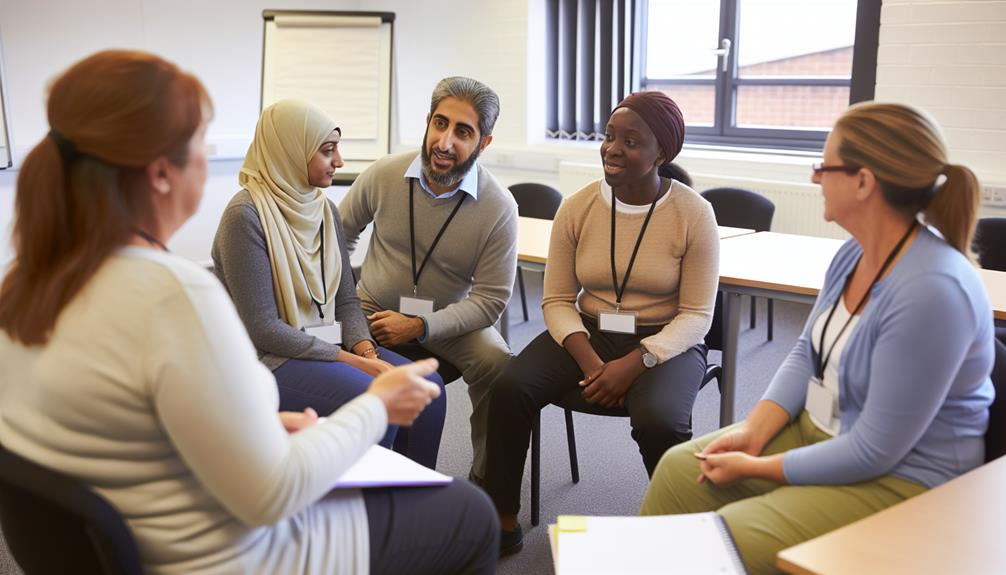Becoming a foster parent in the UK needs preparation. Equip yourself with essential skills such as resilience, financial management and effective communication. Don't overlook the emotional aspect, you'll need to handle attachment issues and create an environment of safety and love. Familiarise yourself with legal aspects, rights and responsibilities. Devise strategies to manage behavioural issues and set clear discipline boundaries. Take advantage of various support services available, including workshops and community guidance. The journey doesn't stop here, there's always more to learn on this rewarding path.
Key Takeaways
- Attend training programs to learn resilience building, financial planning, and effective communication strategies.
- Seek guidance from experienced foster carers or professionals to better understand the legal aspects of foster care.
- Learn techniques for emotional preparation, including handling attachment issues and developing empathy.
- Familiarize yourself with strategies for understanding and managing behavioral issues, and setting discipline and boundaries.
- Leverage support services, such as parenting workshops and support networks, for additional guidance and emotional reassurance.
Understanding the UK Foster Care System

To navigate your journey as a prospective foster parent, it's essential to first grasp the ins and outs of the UK foster care system. This system, though complex, is undergoing significant change due to Foster System Reform. These reforms aim to improve the wellbeing and outcomes for children under foster care, and it's imperative that you're aware of them.
Child Advocacy Initiatives are playing a key role in these reforms. They're campaigning for a greater focus on the child's perspective, ensuring their voices aren't lost in the process. Such initiatives are pushing for training programs that equip foster parents with the necessary skills to provide a nurturing environment.
The UK foster care system is also becoming more inclusive, considering factors such as your age, marital status, and sexual orientation less than your ability to provide a caring home. This shift is a direct result of ongoing advocacy and reform efforts.
Essential Skills for Foster Parenting
Traversing the world of foster parenting requires a toolkit of essential skills, and it's crucial you're well-equipped to provide a safe, loving environment for your foster child. These skills range from resilience building, for those tough days, to financial planning, ensuring you're prepared for the costs associated with raising a child.
Let's breakdown these essential skills:
| Skill | Brief Description | Why It's Important |
|---|---|---|
| Resilience Building | The ability to bounce back from adversity | Foster children often have complex needs, so you'll need the strength to handle these effectively. |
| Financial Planning | Being able to manage finances effectively | Raising a child can be expensive and involves careful budgeting. |
| Communication | Expressing yourself clearly and listening attentively | Clear communication helps establish trust and understanding. |
| Patience | The capacity to accept delay, trouble, or suffering without getting angry or upset | Children need time to adjust, and your patience can make this process smoother. |
| Love and Care | Providing affection and attention | Every child deserves a loving home where they feel cared for. |
Mastering these skills won't be easy, but they're essential to your journey. Remember, the journey may be tough, but the reward is beyond measure.
Emotional Preparation for Foster Care

Becoming a foster parent can be an emotional journey, and preparing yourself for this is crucial.
Understanding emotional intelligence is key, as this will enable you to better comprehend and address a child's needs.
You'll also need techniques to handle attachment issues and navigate feelings of grief and loss, which are common experiences in foster care.
Understanding Emotional Intelligence
How well do you understand the concept of emotional intelligence, and its essential role in preparing for foster care? Emotional intelligence development is key, as it offers numerous benefits for the fostering journey.
- Self-awareness: You're better equipped to understand your own emotions, which is important when handling the emotional needs of a foster child.
- Empathy: Emotional intelligence benefits your relationship with your foster child by improving your ability to empathise and connect on an emotional level.
- Relationship management: Emotional intelligence enhances your skills in managing relationships, making it easier to navigate the complexities of foster care relationships.
Mastering emotional intelligence won't happen overnight, but it's an essential part of your foster parent training. It's a skill worth honing for the wellbeing of both yourself and your foster child.
Coping With Attachment Issues
While developing emotional intelligence plays a significant role in your fostering journey, it's equally important to prepare yourself to cope with potential attachment issues that may arise with your foster child. Understand that different attachment styles reflect in how a child interacts with you. Some children may become overly clingy, while others may seem distant.
To navigate these waters, effective parenting techniques are essential. Practice active listening, show empathy, and establish routines to help your foster child feel secure. Always remember, patience is key. It's not about changing the child's attachment style overnight, but fostering an environment where they feel safe and loved.
You've got this! Your emotional preparedness is a vital step towards successful fostering.
Navigating Grief and Loss
In your fostering journey, you're likely to encounter the delicate terrain of grief and loss, which requires careful emotional preparation. As a foster parent, it's important to understand and respect the child's grief expression, allowing them to freely express their feelings.
Here are three essential tips to help you navigate this challenging aspect:
- Embrace patience: It takes time for a child to come to terms with their loss. Allow the process of loss acceptance to unfold naturally.
- Create a safe space: Encourage open communication. Let them know it's okay to express their grief and that their feelings are valid.
- Seek professional help: If the child's grief persists or significantly impacts their daily life, don't hesitate to consult a mental health professional. Your support and understanding are crucial, but professional guidance can provide additional support.
Navigating the Legal Aspects

Understanding the legal aspects can seem challenging, but grasping these intricacies is an important part of your journey as a potential foster parent in the UK. It's not just about providing a loving home; it's also making sure you're completely clued up on your rights and responsibilities. This is where legal paperwork guidance and foster rights awareness come in.
Legal paperwork may appear intimidating, yet it's essential to the process. Don't be overwhelmed. Each document serves a purpose, whether it's to safeguard the child, protect your rights or confirm the placement. Seek advice from professionals or experienced foster carers. They'll help you navigate the system and understand each document's implications.
Foster rights awareness is equally significant. You're not just an interim caregiver; you're a key player in the child's life. Knowing your rights empowers you to advocate for the child's welfare and ensures your involvement in decisions affecting them. Attend training sessions, workshops, and support groups to learn more about this aspect.
Building Effective Communication Strategies
As you start on your fostering journey, mastering effective communication strategies becomes pivotal, not just for building a strong relationship with your foster child, but also for dealing with social workers, schools, and other professionals involved. Communication is about more than just words; it's about understanding and responding to non-verbal cues, listening actively, and expressing yourself clearly and empathetically.
- Non-verbal cues: Pay attention to body language, facial expressions, and tone of voice. These can often tell you more about what a child is feeling than their words. For example, a child who's hunched over or avoiding eye contact may be feeling anxious or upset.
- Active Listening: This involves not only hearing what's being said but also showing that you're engaged and understanding. Nod, maintain eye contact, and give verbal affirmations like 'I see' or 'I understand' to show you're really listening.
- Expressing Yourself Clearly: Be clear and concise in your communication. Use simple language, be consistent in your messages, and always be honest.
Dealing With Behavioural Issues

As a foster parent, you're likely to encounter behavioural issues that can be challenging to manage. Understanding these issues, combined with effective communication strategies and setting appropriate discipline and boundaries, can be immensely helpful.
Let's explore how these tools can equip you to address and handle behavioural problems effectively.
Understanding Behavioural Issues
Traversing through a child's behavioural issues is unquestionably a challenge, but it's one you're not alone in facing. The key lies in a deep understanding of behavioural patterns analysis and child psychology basics.
- Observation: Note behavioural changes, triggers, and responses. You're not just watching; you're learning their unique patterns.
- Analysis: Use your observations to identify patterns and probable causes. A child's behaviour often mirrors their mental state.
- Action: Implement strategies tailored to the child's needs. Remember, one size doesn't fit all in child psychology.
Understanding behavioural issues isn't just about reacting to problems; it's about proactively seeking understanding. With patience, empathy, and knowledge, you'll be better equipped to guide your foster child through their journey, fostering a nurturing environment where they can thrive.
Effective Communication Strategies
Building on your understanding of behavioural issues, it's time to sharpen your communication skills, as they play an essential role in effectively managing these challenges. Effective communication is more than just talking. It involves active listening techniques, which require patience, empathy, and a non-judgemental attitude. By attentively listening to your foster child's concerns and feelings, you're showing them that their thoughts and emotions matter.
Conflict resolution is also an important part. It's about creating a safe space for open dialogue, setting aside your own assumptions, and focusing on finding mutual solutions. In times of disagreement, remember to stay calm and approach the situation with kindness and understanding. Mastering these strategies will significantly enhance your relationship with your foster child and manage their behavioural issues more efficiently.
Discipline and Boundaries Setting
Handling the intricacies of discipline and establishing boundaries can often feel like a challenging task, but it's an essential part of dealing with behavioral issues in your foster child. To navigate this process, consider these three strategies:
- Establish Clear Rules: Make sure your child understands what's expected. Keep rules simple and direct.
- Consequence Implementation: If a rule is broken, consistently follow through with agreed-upon consequences. This helps to reinforce the importance of boundaries.
- Reward Systems: Recognise good behaviour. This not only encourages repetition but also builds self-esteem.
Accessing Support Services for Foster Parents

Exploring the maze of support services might seem overwhelming, but don't worry, there's a wealth of resources available to assist you in your foster parenting journey. Parenting workshops and support networks are just a few of these essential resources.
Parenting workshops are designed to equip you with the skills and knowledge you'll need to navigate the unique challenges of foster parenting. They offer practical advice and proven strategies for handling a variety of situations. You'll be able to learn from experts in the field and connect with other foster parents, creating a support network that can provide emotional reassurance and practical advice.
Support networks are crucial for maintaining your resilience and perspective. They can include other foster parents, social workers, therapists, and community groups. These networks can offer a listening ear, share experiences, or provide guidance when you're dealing with tough issues.
Frequently Asked Questions
What Kind of Financial Support Is Available for Foster Parents in the Uk?"
In the UK, you're eligible for funding resources as a foster parent. The government provides a weekly allowance to cover child's living costs. Amounts vary based on the child's age and unique needs.
How Can I Balance My Own Personal Life and Responsibilities With the Demands of Foster Parenting?"
Balancing personal life with foster parenting requires emotional resilience and effective time management. It's important to prioritise tasks, carve out personal time, and develop coping mechanisms to handle stressful situations. You've got this!
What Are Some Common Health Issues Faced by Foster Children and How Can I Prepare for These?"
Foster kids often struggle with mental and physical health issues. You're key in providing mental health support and nutritional guidance. Learn about common health concerns, prepare to address them, and build a support network.
Are There Any Specific Cultural or Religious Considerations I Need to Keep in Mind While Fostering?"
Yes, it's vital to exercise cultural sensitivity and provide religious accommodations while fostering. Understanding your foster child's cultural and religious background can help you build a supportive and inclusive environment for them to thrive.
How Does the Process of Adopting a Foster Child Work in the Uk?"
In the UK, adopting a foster child involves meeting eligibility criteria, understanding adoption legalities, and passing a home study. It's a thorough process, but with patience and dedication, you can navigate it successfully.
Conclusion
Fostering isn't a stroll in the park, is it? However, with the correct training, understanding the UK system, honing essential skills, and preparing emotionally, it becomes manageable.
Finding your way through legal aspects, mastering communication strategies, dealing with behavioural issues, and accessing crucial support services are essential too.
Remember, you're not alone in this journey. With the right approach and resources, you can make a meaningful difference in a child's life.




